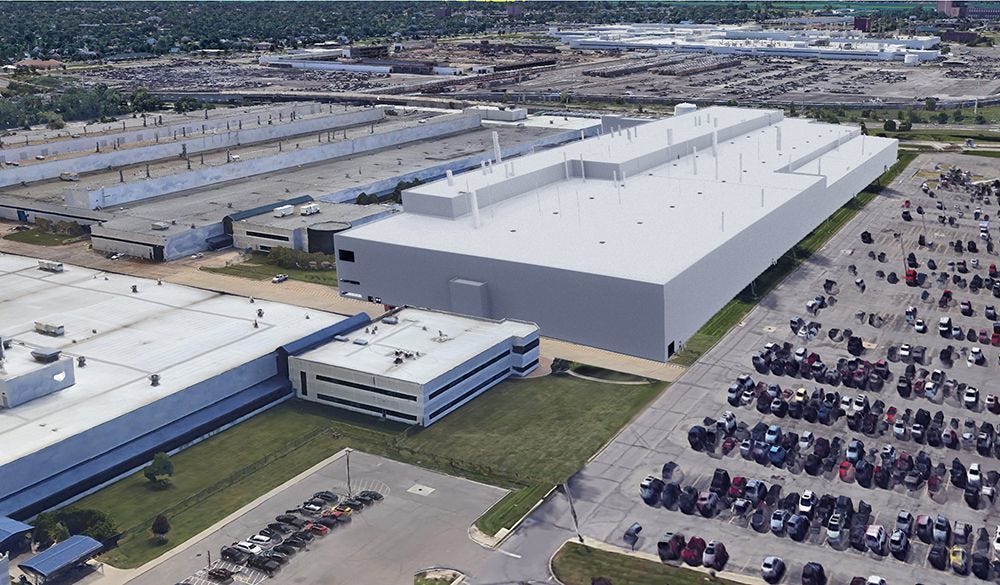Mack Engine expansion gets $93M more in incentives
 Breana Noble
Breana Noble
After approving hundreds of millions of dollars in tax incentives in May for Fiat Chrysler Automobiles NV's plant expansions and upgrades on Detroit's east side, the city and state are supporting another $92.9 million in incentives.
The governing body of the Michigan Economic Development Corp. approved Tuesday the reimbursements to the city of Detroit to prepare for and support the $1.8 billion expansion of FCA's Mack Avenue Engine Complex through the tax capture of eligible activities over 30 years starting in 2022.
The public-private Detroit Economic Growth Corp.'s Detroit Brownfield Redevelopment Authority will use the reimbursements to pay off loans used for site preparation and environmental remediation costs for the property assembled for the FCA project.
FCA plans to reopen its long-idled Mack II plant, as well as convert the Mack I plant from producing engines. The expanded complex will create approximately 3,850 jobs with an average hourly wage of $19.25.
In May, the Michigan Strategic Fund board approved tax incentives to FCA valued at $223.5 million. At the time, the economic development corporation noted a brownfield work plan later would come before the board, which is what its members approved Tuesday.
The investment showcases the state's and city's "heritage and continued leadership in the manufacturing industry," Amanda Bright McClanahan, the Michigan Economic Development Corp.'s chief operating officer, said during a phone call with reporters Tuesday.
The tax incentives approved Tuesday will assist with the costs of demolition, lead and asbestos abatement, and other site preparations. They also include $61 million in property acquisition.
More than $34 million in expected reimbursements is from state school taxes. The other $59 million is from local tax captures. The city additionally has approved a tax abatement to FCA for the first 10 years of the tax captures, which is not included in the $93 million total.
The project also is requesting nearly $38 million from the Michigan Department of Environment, Great Lakes and Energy in tax increment financing to assist with environmental eligible activities.
FCA will provide $1.6 billion for the plant's expansion. The Detroit Brownfield Redevelopment Authority will contribute $150 million to the project, as well.
The Mack Avenue plants will become full assembly facilities for the next-generation Jeep Grand Cherokee, expected to launch in the first half of 2021. The new line will include a plug-in hybrid version as well as a new third-row seat vehicle by the fourth quarter of 2020.
The automaker considered underutilized plants in Belvidere, Illinois, and Mexico for the project, according to the economic development corporation.
The Mack expansion is a part of FCA's $4.5 billion investment in five Michigan plants, including in Detroit, Sterling Heights and Warren.
The Michigan Strategic Fund board previously approved the following for the project:
- $55 million for land assembly activities including land acquisition and site preparation.
- A $10 million grant in a Michigan Business Development Program.
- A 100% Good Jobs for Michigan Withholding Tax Capture for up to 10 years valued at up to $99 million.
- A 100% State Essential Services Assessment Exemption for up to 15 years valued at up to $13.4 million for the Jefferson North Assembly Plant.
- A 100% State Essential Services Assessment Exemption for up to 15 years valued at up to $18 million for the Mack Engine Plants.
The $4.5 billion investment was announced in late February. The city of Detroit worked to assemble 215 acres needed within a nearly 60-day timeline.
It faced challenges in doing so, specifically acquiring 82.2 acres of land owned by the Moroun family's real estate arm, Crown Enterprises. The powerful family owns the Ambassador Bridge between Detroit and Windsor, as well as large parcels of other property in the city. Officials had said the Moroun land was a critical piece of the deal.
The city struck a deal with the Morouns to pay $43.5 million and swap 117 acres of land in return for the parcel at 12141 Charlevoix St. The Moroun property was by far the most expensive, as the city acquired the other 132 acres for $4.6 million.
The city’s total investment in the project is $50.6 million: $36 million from uncommitted City of Detroit bond funds, a $7.5 million loan to the Detroit Brownfield Redevelopment Authority and $7.1 million from the sale of the city's Millennium Garage.
As a part of its community benefits agreement, the automaker must give Detroiters exclusive access for four weeks to apply for the jobs and ongoing priority for job openings for the life of the plant.
In October, Ford Motor Co. received a hefty incentive package for its expansion into Detroit. The Dearborn automaker is investing $740 million into a 1.2 million-square-foot autonomous and electric vehicle campus in that Corktown neighborhood that will be anchored by Michigan Central Station. The Michigan Strategic Fund's board approved $207 million in incentives for it.
bnoble@detroitnews.com